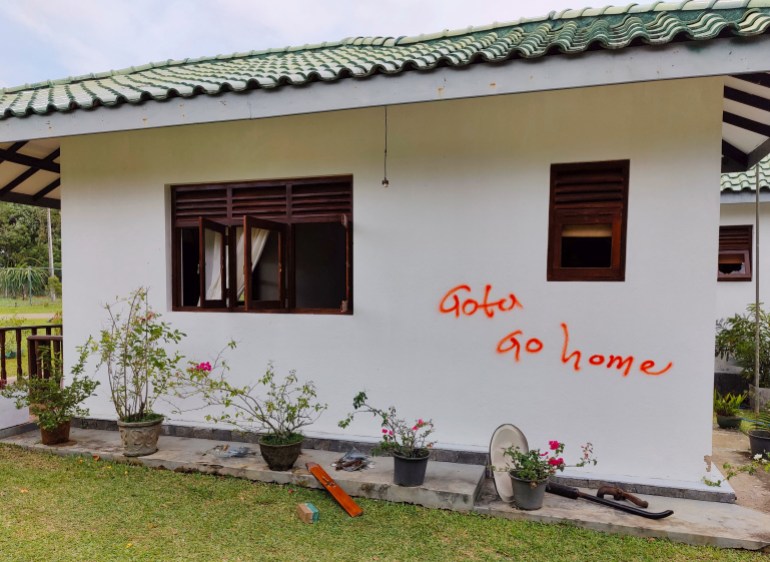Sri Lanka protests to continue as new PM struggles to form gov’t
Ranil Wickremesinghe’s appointment fails to appease protesters demanding the president’s resignation over the economic crisis.

The appointment of a new prime minister in Sri Lanka has failed to appease anti-government protesters demanding the resignation of the president for the country’s disastrous economic crisis.
President Gotabaya Rajapaksa appointed veteran opposition politician Ranil Wickremesinghe as the island nation’s prime minister late on Thursday after a week of violent clashes in which nine people were killed and more than 300 injured.
Keep reading
list of 4 itemsSri Lanka’s returning prime minister: Ranil Wickremesinghe
Sri Lanka court bans ex-PM Rajapaksa, allies from leaving country
How Sri Lanka spiralled into crisis and what happens next
The president’s elder brother, Mahinda Rajapaksa, quit as prime minister on Monday as the violence spiralled and is in hiding in a military base.
Huge public demonstrations have for weeks condemned President Rajapaksa over his administration’s mismanagement of the worst economic crisis to hit the nation since it became independent in 1948.
‘We will not stop this struggle’
Hundreds remain outside his seafront office in the main city of Colombo at a protest camp that has for the past month campaigned for him to step down.
“We will stop this struggle when our people get justice,” said Chamalage Shivakumar, one of the hundreds of people who have camped out at a protest site in the main city Colombo.
“Whoever they appoint as prime minister, we will not stop this struggle until people get relief.”
Wickremesinghe is the only legislator from his United National Party (UNP) in the country’s parliament and will be reliant on rival political parties to form a government.
An alliance led by the Rajapaksas holds about 100 of parliament’s 225 seats, while the opposition has 58 seats. The rest are independent.
Wickremesinghe was struggling on Friday to forge a unity government and forestall an imminent economic collapse after a senior opposition figure refused to helm the finance ministry.
Opposition legislator Harsha de Silva publicly rejected an overture to take charge of the nation’s finances and said he would instead push for the government’s resignation.
“People are not asking for political games and deals, they want a new system that will safeguard their future,” he said in a statement.
De Silva said he was joining “the people’s struggle” to topple President Rajapaksa and would not support any political settlement that left the leader in place.
He is a member of the Samagi Jana Balawegaya (SJB) party, the largest opposition grouping in parliament, which has split on whether to support a unity government without Rajapaksa’s resignation.

Protesters say the appointment of Wickremesinghe will do little to ease the anger against the president, who they say is ultimately responsible for the crisis.
Buffeted hard by the pandemic, rising oil prices and populist tax cuts by the Rajapaksa brothers, Sri Lanka is critically low on foreign exchange, and rampant inflation and fuel shortages have brought thousands onto the street in a month of protests that had remained predominantly peaceful until last week.
Wickremesinghe on Thursday warned the dire situation could get worse in the coming months and called for international assistance.
“We want to return the nation to a position where our people will once again have three meals a day,” he said.
On Friday, Wickremesinghe met India’s high commissioner to Sri Lanka, his first publicly known contact with a foreign government since his appointment.
“Discussed continued cooperation for economic recovery and stability in Sri Lanka through democratic processes,” the Indian High Commission in Colombo said in a tweet.
New Delhi is battling China for influence in strategically important Sri Lanka, which lies on key shipping lanes between Asia and Europe and is home to major infrastructure projects financed by both countries.
Wickremesinghe is seen as a pro-West free-market reformist, potentially making bailout negotiations with the International Monetary Fund and others smoother.
But it remains to be seen whether a new cabinet will be enough to calm public anger if Rajapaksa continues to resist calls for his resignation.